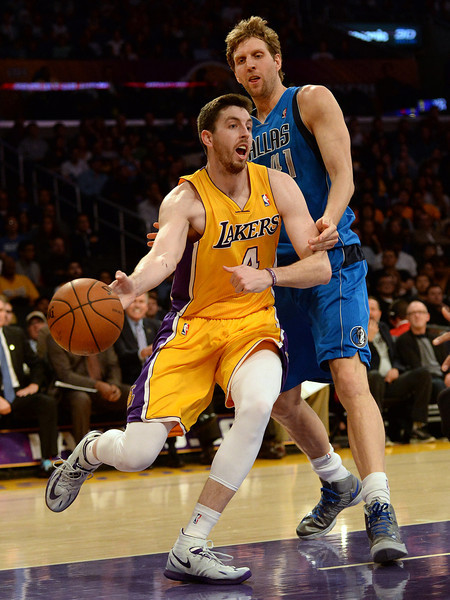The tipoff only happened a few seconds ago. The Lakers did not seem settled enough to begin running an offensive set. The Minnesota Timberwolves barely appeared ready to organize their defensive coverages.
Then out of nowhere, Lakers forward Ryan Kelly provided something that he struggled to do mostly all season amid injuries and an uncomfortable role. He positively impacted the game. Kelly threw down a thunderous one-handed dunk, a play that he believed helped “set the tone” in what became a season-high 21 points on 7-of-12 shooting and seven assists in the Lakers’ 106-98 victory over the Minnesota Timberwolves on Friday at Staples Center.
Yet, what mostly defined Kelly’s performance involved everything else that happened after that play. Kelly looked confident. He consistently made shots. The Lakers collected 35 assists, which Lakers coach Byron Scott quickly pointed out, “a lot of that had to do with Ryan.” All of which summed up a breakout game Kelly called “super valuable” in an otherwise forgettable game as the Lakers (21-58) play only three more contests before finishing a season without a playoff appearance for the second consecutive year.
“I didn’t have the season I would’ve liked,” Kelly said. “Every opportunity I have these last few is an opportunity to prove to the coaching staff, my teammates and our fans that I should be here.”
Kelly actually proved to the Lakers in his rookie season last year that he should be here despite missing the early parts of training camp while rehabbing a surgically repaired right foot. After the Lakers drafted him with the 48th pick of the 2013 NBA Draft, Kelly averaged eight points and 3.7 rebounds while providing consistent shooting, smart decision making and floor spacing. That prompted the Lakers to sign Kelly to a two-year deal around $3.5 million with no options.
But then Kelly experienced overlapping injuries to his left and right hamstrings that sat him out through a combined 30 games through the first two months of the 2014-15 season. Then in a move he suggested he regretted, Scott featured Kelly at the small forward position, a drastically different role than his customary responsibility he assumed his whole career as a so-called stretch power forward.
“He couldn’t play the 3. He knew it and I knew it. It wasn’t a comfortable position for him,” said Scott, who noted the smaller players he defended remained much quicker. “Putting him back in his natural position allowed him to be more comfortable out there and play basketball a little bit more freely. I think it’s shown since he’s been at the 4, he’s played much better. That’s his natural position and I knew that from the start. Having him back there and playing the way he has played helps him with his confidence as well.”
That explains why Scott sounded blunt on whether he would ever play Kelly at small forward again.
“Probably not,” said Scott, though he called the move a “necessity” because of an eventual season-ending injury to Nick Young (left knee) and the team’s bloated frontcourt in Carlos Boozer, Jordan Hill, Ed Davis and Tarik Black.
In retrospect, Kelly called it “a pain in the butt” to experience his hamstring issues. But Kelly declined to provide the same description on playing at small forward, even if he revealed he had trained all of last summer at the power forward position without any inclination he could have spent his time preparing for a new role.
Although he conceded he’s “definitely comfortable” at the power forward, Kelly called his previous responsibility “a learning experience.”
“I just took it as an opportunity to learn and expand my game,” Kelly said. “Was it as pretty as I wanted it to be? No, certainly not. But like I said, there’s no question I became a better player by playing that position.”
But Kelly showed against Minnesota that he remains a better player at his more natural spot.
He may have experienced a shooting slump, most notably in a 3-of-17 clip against the Clippers. But Scott encouraged Kelly to keep shooting, mindful that he remains fixated on making the right play. That mindset paid off against Minnesota.
Kelly scored eight points in the first quarter, which exceeded his scoring output in 32 games he played this season. Kelly played the entire third quarter, which opened up with him making consecutive three-point shots. His passing and presence alone spurred the kind of ball movement the Lakers craved all season.
“He spaced the floor. He swings it. He’s definitely an high IQ player,” Lakers forward Ed Davis said of Kelly. “He’s not going to force anything. Things like that always helps.”
It helps that Kelly has averaged 11 points on 43.56 percent shooting and 3.5 assists since playing at power forward in the past 11 games. That marked a drastic jump from when he averaged 4.0 points on a 30.1 percent clip, 2.6 rebounds and 1.1 assists through 38 games at small forward. It also helps how Kelly has increased his production.
He will never turn down an open shot. But Kelly remains reluctant to take a contested look, mindful that better ball movement will stretch the floor and make teammates feel more involved in the game.
“That gets people moving and people excited. Every basketball player likes to feel the ball in their hands a little bit,” Kelly said. “When you go possession after possession and you don’t touch the ball, it can be frustrating. I try to keep the ball moving.”
Kelly also said he will try to keep moving too, the last three NBA games of an otherwise frustrating season giving him a chance to experience a happy ending.
RELATED:
Lakers’ Byron Scott favors NBA making ‘tweaks’ to draft lottery system
Jeremy Lin’s future with Lakers up in the air
Andrew Wiggins hoping to emulate Steve Nash and highlight basketball in Canada
Follow L.A. Daily News Lakers beat writer Mark Medina on Twitter and on Facebook. E-mail him at mark.medina@langnews.com

